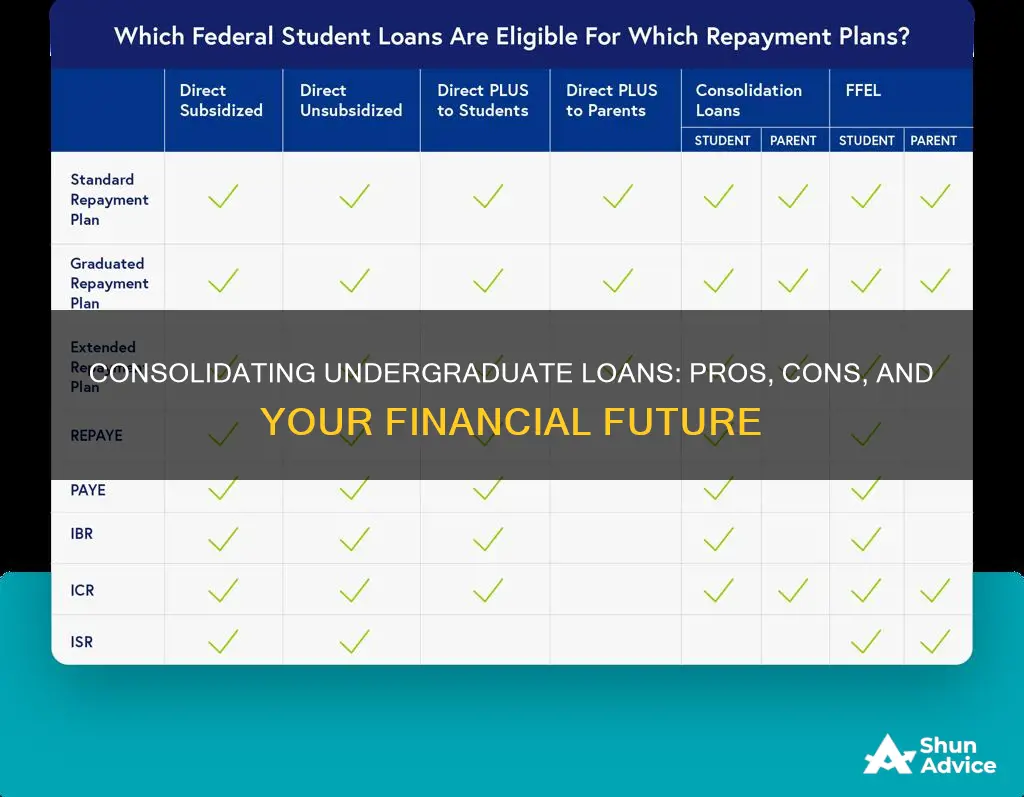
Undergraduate loans can be a serious financial burden, and consolidating them can be a great way to make them more manageable. Consolidation involves combining multiple loans into one, which means you'll only have to make one monthly payment instead of several. This can be especially helpful if you're struggling to keep track of multiple payments and due dates. However, it's important to note that consolidating your loans may not lower your interest rate, and you may even end up paying more interest over time. Additionally, consolidating federal loans into a private consolidation loan will cause you to lose the benefits and protections of federal loans. Before making any decisions, it's recommended to consult a financial advisor and carefully consider the pros and cons of consolidating undergraduate loans.
| Characteristics | Values |
|---|---|
| Pros | One payment per month, retain federal benefits, access to repayment plans, fixed interest rate |
| Cons | Potentially higher interest rate, longer repayment period, loss of credit for previous payments, loss of federal protections |
| Loan type | Federal student loans |
| Interest rate | Fixed, calculated as the weighted average of the original rates |
| Application | Free, no fee, can be done through the Federal Student Aid website |
| Time | Shouldn't take longer than 30 minutes if all information is ready |
What You'll Learn

Pros and cons of consolidating undergraduate loans
Consolidating undergraduate loans can be a strategic move to help you manage your debt. Here are some pros and cons to help you decide if it is the right choice for you.
Pros
- Consolidating your loans can simplify your payments into one monthly bill, making it easier to manage your debt.
- You may be able to lower your monthly payments, making your loans more manageable.
- If you have federal loans, consolidating into a Direct Consolidation Loan can give you access to new repayment options and federal loan forgiveness plans.
- Consolidating can help you retain federal benefits like forbearance, income-driven repayment, and hardship relief options.
- If you are unhappy with your loan servicer, consolidating your federal loans allows you to choose from a handful of servicers to manage your new direct loan.
- If you have private student loans, you can consolidate multiple loans into one private loan or refinance your loans to get a better interest rate.
Cons
- Consolidating your loans may increase your interest rate, and you may end up paying more interest over time.
- Consolidation may extend your repayment period, which means you will be in debt for longer, potentially impacting your other financial priorities.
- If you have federal loans, consolidating into a private consolidation loan will cause you to lose the federal loan's benefits and protections.
- If you have unpaid interest, your principal balance will go up.
- You may lose credit for your payments toward income-driven repayment (IDR) forgiveness.
- If you consolidate or refinance student loans with non-student loans, the refinanced loan may no longer qualify for the student loan interest tax deduction.
SLMB Eligibility: Does Loan Income Count?
You may want to see also

How to consolidate undergraduate federal loans
Undergraduate students with federal loans can consolidate their loans into one loan with one monthly payment. The type of consolidation loan available to you depends on whether you have federal or private student loans. If you have federal student loans, you can combine some or all of them into a Federal Direct Consolidation Loan (Direct Consolidation Loan).
Before consolidating your undergraduate federal loans, it is important to evaluate the terms of a potential private refinance loan carefully. Here are some key steps and considerations:
- Understand the benefits and risks: Weigh the pros and cons of consolidating your federal loans into a private consolidation loan. By consolidating, you may gain a lower monthly payment, but your repayment period could be longer, and your total interest paid over the life of the loan may increase.
- Consider the interest rate: Your new consolidation loan will generally have a new interest rate. The interest rate on a Direct Consolidation Loan is a weighted average of the interest rates of the loans being consolidated, rounded up to the nearest one-eighth of one percent. While consolidating may slightly increase your interest rate, it locks you into a fixed rate, so your payment won't change over time.
- Evaluate existing benefits: If you have benefits on some of your loans that you could lose by consolidating, you don't have to include those loans in the consolidation. For example, if you have Federal Perkins Loans and your work qualifies you for Perkins Loan cancellation benefits, you should not include those loans in the consolidation.
- Understand the impact on co-signers: Consolidating your loans may release a co-signer from your existing student loan, depending on the terms of the consolidation loan.
- Tax implications: If you consolidate or refinance student loans with non-student loans into one loan, the refinanced loan may no longer qualify for the student loan interest tax deduction.
- Start the application process: You can start the Direct Consolidation Loan Application to explore what consolidation will mean for you. You don't have to complete the application if you're not ready to consolidate, and you can quit at any time. Contact your loan servicer for free help if you have any questions.
Remember, once your federal loans are consolidated, the process cannot be undone, so it is important to carefully consider all the factors before making a decision.
Interlibrary Loan: Can You Borrow DVDs and Movies?
You may want to see also

How to consolidate undergraduate private loans
Undergraduate students with multiple federal student loans can consolidate them into a single, new federal loan on studentaid.gov. This can simplify your payments, lower your monthly bill, and lengthen your repayment term. However, it is important to note that consolidating your federal loans may not lower your interest rate.
If you have private student loans, you can consolidate them into one private loan through a private lender or bank. This is also known as refinancing. Refinancing allows you to get a new private loan at a lower interest rate, especially during periods of low-interest rates. It is important to carefully evaluate the terms of a potential private refinance loan before making a decision. Consider the APR, as the monthly payment may be lower, but the interest rate could be higher if the loan term is spread out over more years.
When consolidating federal student loans into a private consolidation loan, you will lose the federal loan's benefits and protections, such as income-driven repayment and Public Service Loan Forgiveness. This type of consolidation cannot be reversed, so it is important to weigh the benefits and risks carefully.
Additionally, consider the tax consequences of consolidating or refinancing your student loans. If you consolidate or refinance student loans with non-student loans into one loan, the refinanced loan may no longer qualify for the student loan interest tax deduction.
Before deciding to consolidate or refinance your undergraduate private loans, it is important to consider the pros and cons of each option and how it will impact your specific financial situation.
Refinancing Loans Early: A Smart Move or Not?
You may want to see also

Impact of consolidating undergraduate loans on interest rates
The impact of consolidating undergraduate loans on interest rates can vary depending on the type of loans and the consolidation method chosen. Here are some key points to consider:
Interest Rate Calculation
When consolidating federal student loans into a Direct Consolidation Loan, the interest rate is calculated as the weighted average of the interest rates of the individual loans being consolidated. This rate is then rounded up to the nearest one-eighth of a percent. This means that even if you had low-interest rates on some of your original loans, the new consolidated rate may not be significantly lower.
Fixed vs. Variable Rates
Consolidating undergraduate loans can provide the benefit of locking in a fixed interest rate. This means that your interest rate will remain stable throughout the life of the loan, providing predictability and protection against potential increases in variable interest rates. However, it's important to note that this fixed rate could be higher than the original rates on some of your loans.
Extended Repayment Period
Consolidation may lead to a lower monthly payment, but it could also extend your repayment period. For example, your repayment period could increase from 10 years to 20 or 30 years. This longer repayment period will result in paying more interest over the life of the loan. Therefore, while consolidation can provide short-term relief with lower monthly payments, it may cost you more in the long run due to the extended repayment schedule.
Loss of Federal Benefits
Consolidating federal loans into a private consolidation loan will result in losing the benefits and protections associated with federal loans. Federal loans typically offer fixed interest rates, while switching to a private loan with a variable rate could lead to an interest rate increase over time. Additionally, federal loans provide access to forgiveness programs, income-driven repayment plans, and benefits like forbearance and hardship relief options.
Private Loan Consolidation
If you have private student loans, consolidating them with a private lender or bank can provide the benefit of combining multiple loans into one, potentially resulting in a lower overall interest rate. However, private loan consolidation does not carry the same protections and benefits as federal loans, and it's important to carefully evaluate the terms and conditions of any private refinance loan.
Married Couples: Easier Loan Acquisition?
You may want to see also

Impact of consolidating undergraduate loans on credit score
The impact of consolidating undergraduate loans on credit score can vary depending on an individual's financial circumstances. While consolidating loans can have both positive and negative effects on one's credit score, it is important to carefully evaluate one's financial situation before making a decision.
One positive effect of consolidating undergraduate loans is the potential simplification of multiple loan obligations into a single monthly payment. This can improve an individual's credit score by making it easier to manage their debt and reducing the risk of missed payments. Additionally, consolidating loans can lead to a lower interest rate, which can positively impact an individual's credit score over time.
On the other hand, consolidating undergraduate loans may also have some negative effects on one's credit score. Initially, there may be a minor dip in the credit score due to the hard inquiry associated with the new loan application. This temporary drop can be more significant if an individual applies for multiple loans within a short period. Furthermore, consolidating loans can result in the loss of benefits associated with the original loans, such as loan forgiveness or income-driven repayment plans, which could negatively impact an individual's broader financial situation and creditworthiness.
Another factor to consider is the potential increase in the total interest paid over the life of the loan. While consolidating undergraduate loans may lower monthly payments, it can also extend the repayment period, leading to higher overall interest costs. This could negatively impact an individual's credit score by increasing their overall debt burden.
It is worth noting that consolidating federal student loans into a private consolidation loan results in the loss of federal loan benefits and protections. Therefore, it is crucial to carefully weigh the benefits and risks before making a decision, as consolidating federal loans into a private loan is irreversible.
Hospital Bills: Impacting Loan Decisions?
You may want to see also
Frequently asked questions
Loan consolidation is the process of combining different loans into one new loan. Instead of making multiple payments to multiple lenders, you make one payment to one lender every month.
Consolidating undergraduate loans can make repayment more manageable by reducing the number of monthly payments. It can also help you access federal student loan repayment and forgiveness plans, and retain federal benefits such as forbearance, income-driven repayment, and hardship relief options. Consolidation can also help you get out of a default if you've fallen behind on your student loans.
Consolidating undergraduate loans may not lower the interest rate, and you may end up paying more interest over time. You may also lose credit for payments made toward income-driven repayment plans and Public Service Loan Forgiveness (PSLF). Consolidation may also extend your repayment period, which will increase the total interest you pay over the life of the loan.
An alternative to consolidating undergraduate loans is to refinance them. Refinancing involves taking out a new loan with a lower interest rate, which can help you pay off your loans faster and more cheaply. However, if you refinance federal loans into private loans, you will lose federal benefits.







